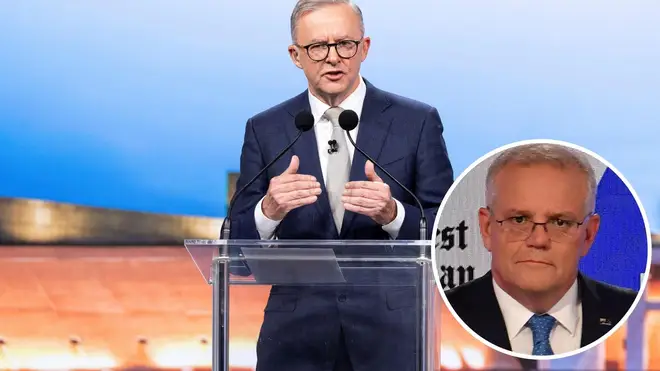
Nick Abbot 10pm - 1am
21 May 2022, 14:08 | Updated: 21 May 2022, 22:57

Anthony Albanese will be Australia’s new prime minister, overseeing the country's first Labor government after incumbent Scott Morrison conceded defeat.
Mr Albanese is to become PM and is likely to form a coalition with other smaller parties. The centre-left Labor Party had been favourite to win its first election since 2007.
Mr Morrison arrived at his Liberal party's headquarters today and conceded defeat to Mr Albanese.
He congratulated his rival on his election success, saying: "This has been a time of great upheaval."
"It is important for our nation to heal" from disruption, he added.
Following his win, Mr Albanese wrote on Twitter that his country "voted for change".
Delivering his election victory speech, he said: "It says a lot about our great country that a son of a single mom who was a disability pensioner, who grew up in public housing down the road in Camperdown, can stand before you tonight as Australia's prime minister.
"Every parent wants more for the next generation than they had. My mother dreamt of a better life for me.
"And I hope that my journey in life inspires Australians to reach for the stars."
Boris Johnson has congratulated the new leader on his election.
He said in a statement: "Our countries have a long history and a bright future together. As thriving like-minded democracies we work every day to make the world a better, safer, greener and more prosperous place.
"As we reap the rewards of our comprehensive Free Trade Agreement, the AUKUS partnership and the unmatched closeness between the British and Australian people, we do so knowing that the only distance between us is geographical.
"I look forward to working with Prime Minister Albanese in the weeks, months and years ahead as, together, we tackle shared challenges and demonstrate the importance of our shared values."
Foreign Secretary Liz Truss also wished Mr Albanese congratulations on Twitter, saying: "As freedom-loving democracies we will continue to work together for a free and open Indo-Pacific, boosting our trade and deepening our security ties through AUKUS."
Congratulations @AlboMP on your election as Australian Prime Minister.
— Liz Truss (@trussliz) May 21, 2022
As freedom-loving democracies we will continue to work together for a free and open Indo-Pacific, boosting our trade and deepening our security ties through AUKUS 🇬🇧🇦🇺
The Labor party's leader, Mr Albanese, is to become prime minister after Mr Morrison's conservative Liberal Party failed to win the minimum 76 seats needed for a majority in the 151-seat parliament.
Both leaders campaigned in Melbourne on Saturday before voting in their hometown of Sydney.
The first polling stations closed on the country's east coast at 6pm local time (8am GMT). The west coast is two hours behind.
Due to the pandemic, more than 48% of Australia's 17 million electors voted early or applied for postal votes. Voting is compulsory for adult citizens and 92% of registered voters cast ballots at the last election.
Early polling for reasons of travel or work began two weeks ago and the Australian Electoral Commission will continue collecting postal votes for another two weeks.
The government changed regulations on Friday to enable people recently infected with Covid-19 to vote over the phone.
Australian Electoral Commissioner Tom Rogers said more than 7,000 polling stations opened as planned and on time across Australia despite 15% of polling staff falling sick this week with Covid-19 and flu.
Mr Albanese said he had thought Mr Morrison would have called the election last weekend because Australia's prime minister is expected at a Tokyo summit on Tuesday with US President Joe Biden, Japanese Prime Minister Fumio Kishida and Indian Prime Minister Narendra Modi.
"If we get a clear outcome today then whoever is prime minister will be on a plane to Tokyo on Monday, which isn't ideal, I've got to say, immediately after a campaign," Mr Albanese said.